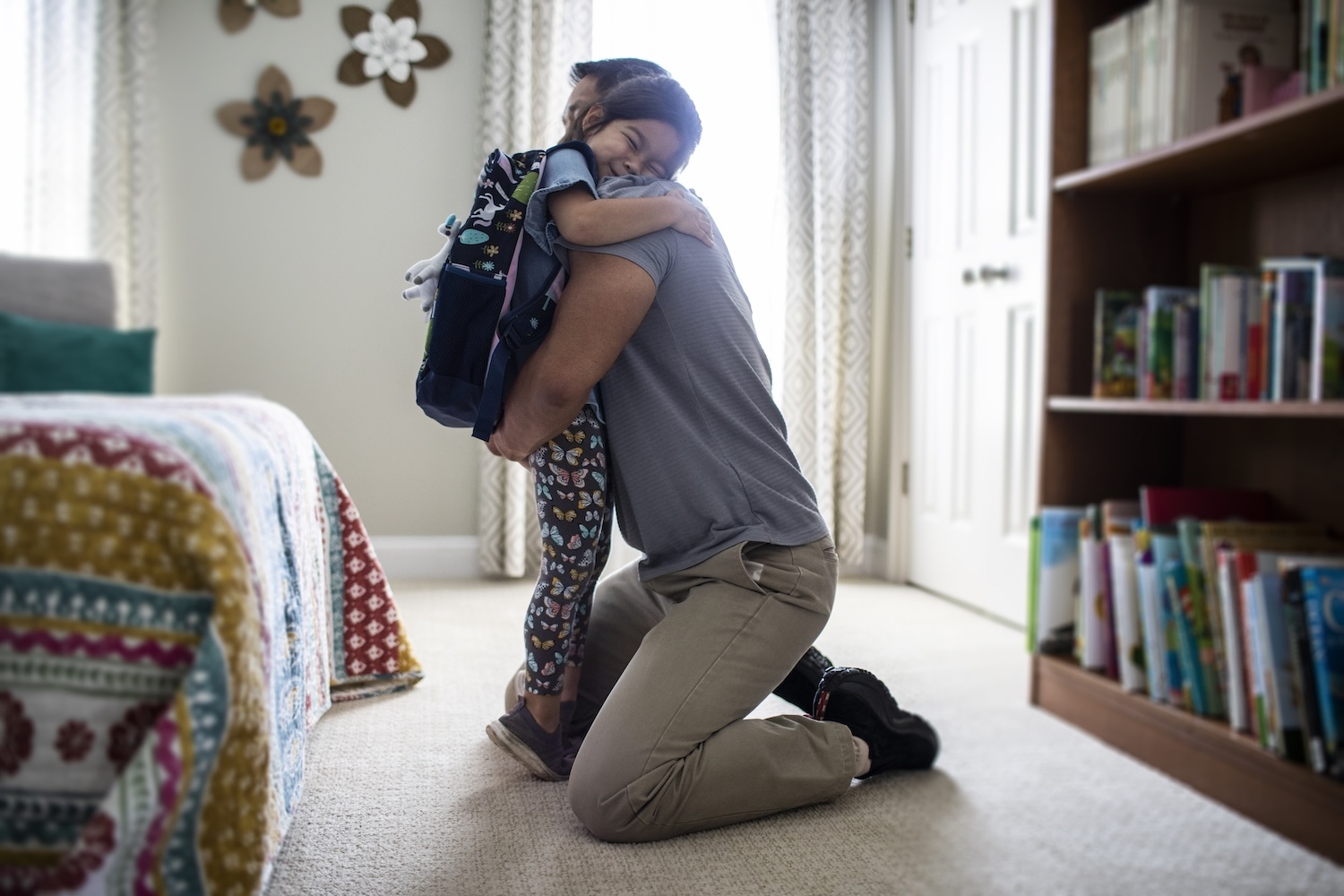

Parents can support their kids at every age to make the transition back to school a little easier
The annual back-to-school transition can be a major source of stress for many children, especially in the post-COVID world.
Increased social anxiety, fear of bullying, and mounting peer pressure are common struggles. Instead of telling children to toughen up or downplaying their concerns, it’s important for parents to normalize anxious feelings and remind their children that nervousness is completely natural.
Brooke Campbell, a Clinical Therapist at Loma Linda University Behavioral Health, encourages parents to recognize nerves and anxiety in their children as an opportunity to open communication.
“Asking questions like, ‘What’s making you nervous?’ provides a space to brainstorm solutions together,” Campbell says.
By identifying the root cause of a child or teen’s back-to-school anxiety, parents can offer the right support to ease the transition from summer break to the classroom and set their child up for success.
While back-to-school anxiety can look different depending on a child’s age, Campbell offers practical advice to help parents support children at every stage.
Elementary school
Young children often experience separation anxiety when starting school for the first time or spending extended periods away from home.
Campbell says it's common for little kids to have thoughts like:
-
When will they come to get me?
-
What if I don't make friends?
-
What if people don't like me?
-
I'll never make as many friends as my older sibling
However, Campbell warns that young children often don't have the vocabulary or self-awareness to say, “I’m feeling anxious.”
“Anxiety can show up through nonverbal cues and changes in behavior,” Campbell explains. “Pay attention to signs that may seem small — nervous tics, obsessive hair twirling, persistent coughing, eye twitches, repetitive movements, nail biting, muscle spasms, or skin scratching.”
These subtle behaviors can be indicators that a child is struggling emotionally.
On the other hand, mild symptoms like sweating, being a little shy, or expressing nerves with some tears are normal pre-jitters in the first days back at school and might not be signs of anything out of the ordinary for their age.

How parents can help elementary-aged children
Starting the day with sugary foods can spike anxiety, whereas balanced meals with protein, complex carbohydrates, fruits, and vegetables can help regulate mood and support brain function.
“Setting kids up with the right fuel gives them a better chance of managing their emotions and staying focused throughout the day,” Campbell says.
She also encourages parents to acknowledge what their kids are feeling rather than shaming a child for being nervous. A simple response to an anxious child is “I understand you’re nervous. How can I help?”
Finally, small gestures like putting their favorite stuffed animal into their backpack or packing a special snack for lunch can provide some ease during the school day. Giving children some sense of control and comfort during uncertain transitions can make a powerful difference.
Middle school
Middle school can be one of the most challenging periods in a child’s life. Not only are they adjusting to a new school environment, but they’re also navigating puberty. Parents may struggle to keep up with these changes, sometimes finding it frustrating when their child becomes moody or distant.
"Because of puberty, middle school is when kids become more self-conscious,” Campbell says. “They’re noticing how their bodies are changing and becoming hyper-aware of their differences from peers.
The pressure of social comparisons can often lead to bullying, intensifying a child's anxiety and sense of isolation.
“When kids don’t know what to expect, or fear rejection, it becomes incredibly difficult to feel secure,” Campbell says.

How parents can help middle schoolers
Giving middle schoolers a sense of control is key. While you might not send them off with a stuffed animal anymore, parents can empower their children by helping them build confidence and self-esteem. For example, if a child is nervous about starting school without knowing anyone, parents can research school clubs, teacher names, and class activities ahead of time.
“Let them know what they’re good at,” Campbell says. “Celebrate their strengths and remind them that they’re worthy, loved, and uniquely talented.”
For children worried about bullying, parents can help them identify trusted adults at school and discuss how to report issues to teachers or counselors. Knowing where to turn can help kids feel more secure and empowered.
High School
One of the most pivotal times in a child’s life is high school. Increasing academic pressure, personal identity development, and looming questions about the future can make the high school experience an overwhelming, anxiety-inducing time for teenagers. And their stress only increases as they progress from freshman year to senior year.
“One major stressor is academic performance,” Campbell says. “Test anxiety and pressure over grades are rampant, made worse in the wake of COVID-19, which disrupted learning and heightened mental health challenges.”
Many teens see grades as make-or-break moments, believing one bad score could ruin their future.
However, the pressure doesn’t stop with academics. Failing a driver's test, struggling to keep up with a social life, and romantic relationships add additional layers of anxiety and potential feelings of shame.
For seniors, that final year of high school also means the uncertainty of college admissions, fear of being unprepared for life outside of the campus, or even having to move out after graduation.

How parents can help high schoolers
To help support high school students, Campbell says that parents need to listen more, check in often, and remind them that it's okay not to have it all figured out.
“While teens may crave independence, they still need guidance, support, and reassurance,” Campbell says. “Parents shouldn’t try to control the ship, but they should absolutely remain on board.”
Teens benefit from the wisdom and experience of their parents, especially as they face challenges like finding a job, applying to college, or managing basic responsibilities for the first time. Simple gestures like helping them with job applications can ease the transition into adulthood and show that they’re not alone.
Campbell also encourages parents to normalize seeking help, whether that is with a teacher, school counselor, or therapist.
"Most schools have mental health resources, but teens need to be reminded that using them doesn’t mean they’re weak. It means they’re taking responsibility for their well-being,” Campbell says.
If you think your child might benefit from therapy, schedule a free assessment or call us at 909-558-9113.



